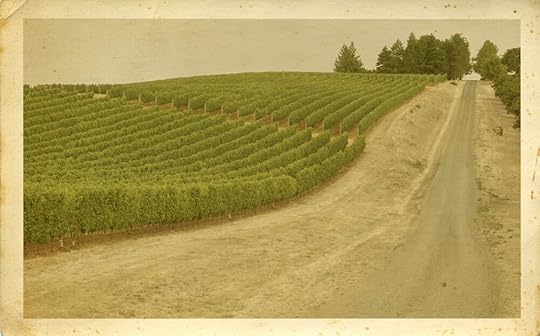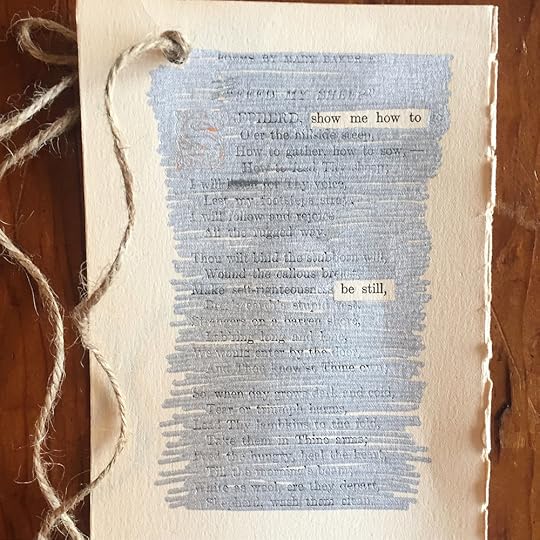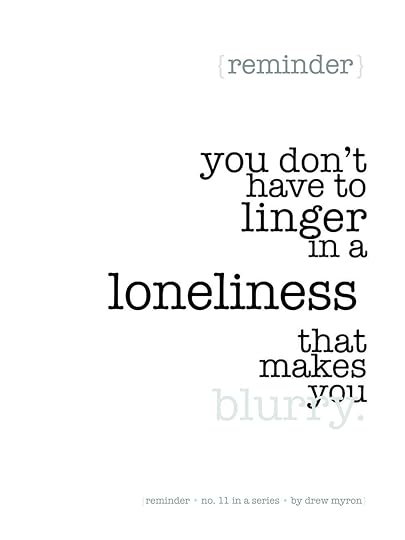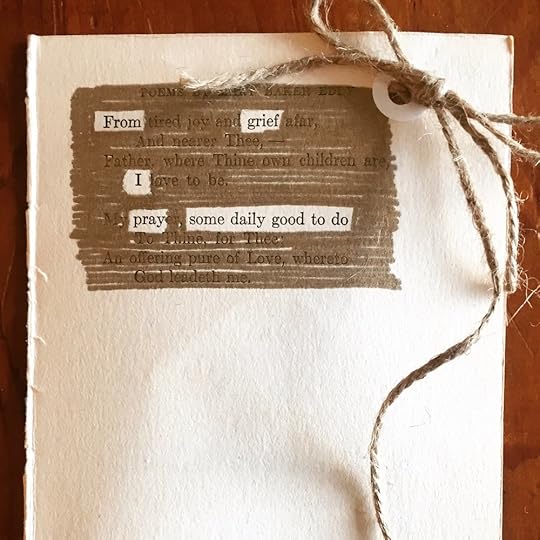Drew Myron's Blog, page 23
September 25, 2019
Thankful Thursday: Terroir

In the vineyard
mahogany vines hang heavy
against a wide blue sky
the day spreads a feast just for us
say yes now
drink the mystery
of cedar and soil
taste the dark gloss
of plump summer fruit
know the terrain
of this generous world
— Drew Myron
from Thin Skin
Please join me for Thankful Thursday, a weekly pause to express appreciation for people, places, things and more. Joy expands and contracts in direct relation to our sense of gratitude.
What are you thankful for today? What makes your world expand?
Note: Terroir - noun - ter·roir
The combination of factors, including soil, climate, and sunlight, that gives wine grapes [ and people ] their distinctive character.
September 2, 2019
On Sunday Sadness

Be Still, an erasure poem by Drew Myron
Wasn’t it a great weekend, full of sunshine and good times, friends and fun? Yes, for me also.
But then Sunday evening arrives and a sadness creeps in. Always something lonely about a Sunday night (or a Monday holiday that feels like a Sunday).
It’s not just me. Go ahead, google “Sunday sadness” and see the pages pile up.
Sunday sadness is so common it’s made the Urban Dictionary: “a feeling of fatigue, depression or anxiety felt on Sunday.”
The quasi-authority on modern life, Real Simple, backs this up: “Even after the best of weekends (or especially after the best of weekends), there’s a cloud that descends.”
This vague edgy-melancholic state is more than dread for the workweek ahead (I like my job! I love structure!). This is not depression, but more of an existential fugue, a spiritual restlessness, a distant cousin to malaise.
On Sunday nights, I find myself reading poems and writing long searching letters to faraway friends. I try to write my own poems but my thoughts are scattered, too loose to pin, too pinned to let loose.
Given that this day is widely set aside for spiritual nourishment, maybe this sadness is God giving a nudge. But instead of encouraged, I feel the familiar gnaw of church and faith: ache and sadness, relief and weight.
Late Meditation (excerpt)
Do you think His arms
are going to make
a cradle
for your head
so you can finally
fall asleep?
The yellow crocus just outside the front door is not a miracle of light
But pretty close
in its papery
stillness
The only color in the entire yard
We are trying
very hard
to be alone
— Michael Dickman
The End of the West
August 28, 2019
Thankful Thursday: Abundance

Because attention attracts gratitude and gratitude expands joy, it's time for Thankful Thursday.
On this Thankful Thursday, I am flush with abundance.
And neighbors. And fresh food. And kindness.
My neighbor, whom I don’t know well, brings me a bag of peaches.
And a bag of tomatoes the next week.
And another bag last week.
Before she shared her garden bounty, we would occasionally wave at each other from across the street. Now, I’m eager to see her cheery face, and we cross the road to chat. We might even be friends.
Another neighbor, whom I have shared only waves from the car, brings a bag of apples. The tree is really producing, he says, I can’t keep up.
I make an apple pie. A few days later, he calls to me. Want some more? Yes, I say, yes!
All week I feel neighborly and good-natured. I am full of fresh food, and filled with an abundance that swells from kindness. How simple this feeling, yet how very grand.
A Song for Merry Harvest
Bring forth the harp, and let us sweep its fullest, loudest string.
The bee below, the bird above, are teaching us to sing
A song for merry harvest; and the one who will not bear
His grateful part partakes a boon he ill deserves to share.
The grasshopper is pouring forth his quick and trembling notes;
The laughter of the gleaner’s child, the heart’s own music floats.
Up! up! I say, a roundelay from every voice that lives
Should welcome merry harvest, and bless the God that gives.
The buoyant soul that loves the bowl may see the dark grapes shine,
And gems of melting ruby deck the ringlets of the vine;
Who prizes more the foaming ale may gaze upon the plain,
And feast his eye with yellow hops and sheets of bearded grain;
The kindly one whose bosom aches to see a dog unfed
May bend the knee in thanks to see the ample promised bread.
Awake, then, all! ’tis Nature’s call, and every voice that lives
Shall welcome merry harvest, and bless the God that gives.
— Eliza Cook, 1818-1889
Known as a poet of the working class, Eliza Cook wrote poems that advocated for political freedom for women and addressed questions of class and social justice, according to the
Academy of American Poets
. Despite her popularity, she was criticized for the ways in which she bucked gender conventions in both her writing and her life; Cook wore male clothing and had a relationship with American actress Charlotte Cushman, to whom she addressed a number of her poems.
It's Thankful Thursday. Joy expands and contracts in direct relation to our sense of gratitude. What are you thankful for today? A person, a place, a possession? A story, a song, a poem? What makes your world expand?
August 20, 2019
Note to (blurry) self

Reminder, a series by Drew Myron
This is no. 11 in a series of reminders that serve as notes and poems to myself — and now you. Is your head as crowded as mine? It’s okay, jot a note and take a rest.
You don’t have to linger
in a loneliness that makes you blurry.
You can fill in blanks make up a story
sound out the silence with something
more than understanding,
stir the understanding with something more than tears,
stir the tears with something more than surrender.
In the math of wanting,
you can contradict your self
praise the grace of quiet things
the malignant sadness and
surprising sweetness of
every day.
— Drew Myron
August 12, 2019
Love This Line: "We pretend . . . "

“We pretend to want things we don't want so nobody can see us not getting what we need.”
— Lisa Taddeo, author of Three Women
Don’t judge a book by its cover, they say, but even more pressing is don’t judge a book by its marketing campaign.
Three Women has been billed as a “groundbreaking portrait of erotic longing in today’s America.” But that wasn’t my experience. Rather than a comprehensive examination of female desire, this work of literary nonfiction offers a deep and engaging view of three complex and frayed women. Taddeo is a journalist who writes like a poet, telling stories with extraordinary empathy and nuance.
This book wasn’t what it said it would be — it was better.
July 18, 2019
Thankful Thursday: Catalog of Cures

Writer tries drawing, with help from Lynda Barry and Writing the Unthinkable.
Catalog of Cures
Wild sweetpeas grow along abandoned curbs
At 4am, roused by birdsong
Try to draw, try to sing, try a new you
Along a chain link fence, a clutch of roses grow in a perfect bouquet
In the distance you see a runner gliding, as if weightless,
as if ease is for anyone who believes in light
A friend brings bubbles
A thrush of balsam root on a slope
The ting ting ting of ice in a glass
I find a recipe in my mother's scrawl
The letter we keep writing ourselves
Twilight, dusk, dawn — the hush of changing light
Ghosts fade, and memories are made and remade
What we recall depends on us
We would give anything for what we have, writes Tony
Some days in summer, when you are tired and aching
and if you are lucky and looking
the world offers to you a cascade of cures
— Drew Myron
It’s Thankful Thursday. Please join me in a weekly pause to express appreciation for people, places, things & more. From the small to the immense, the world contracts and expands in relation to our gratitude. What are you thankful for today?
Want more of this? It’s free & easy (my favorite words).
You can get each blog post delivered directly to your email.
Click here to subscribe.
July 1, 2019
Epidemic of Loneliness

“In Grief,” an erasure poem by Drew Myron
Dear S.
I share an easy banter with a cheerful resident at the nursing home.
How are you? I’ll ask, and he’ll break into a full smile and say, Great as cake! or Fine and dandy!
But this morning he takes a long pause and his face is a grim fixed line.
I've got my hurts all stored up here, he says, motioning to his head. And if I keep walking, if I keep moving, it doesn't hurt so much.
I hope he means a headache but the sadness in his eyes says heartache.
Can I walk with you, I ask? And so we move slowly down a long hall.
No one visits, he says, but I don’t care anymore. You get to a point, he says, stopping to look me in the eye, that you just don't care anymore. I guess that's where I am.
* * *
Some weeks, some days, maybe right now, I don't know what to do with this grief like a collection of heavy rocks. Doesn't it feel so heavy? It's death, but not just death. It's carrying all the little losses — of age and health and hurts.
How did we live before we live now? How did we once tread lightly and still manage to make the days matter? I'm thinking of you, and me, and so many yous and mes.
I don't know what I'm writing, or feeling, but I know these words are a reaching out in love.
* * *
All day I think about the loneliness that circles this man and nearly everyone I know.
“We’re living in an epidemic of loneliness,” a colleague tells me.
* * *
A few hours later, a seemingly tireless volunteer leads a small group in song. Thin frail voices sing old fashioned hymns, and though my office is down the hall, the sound wafts my way and nearly breaks me apart.
Walking past, I hear her end in prayer: You know our hearts. We all desire healing.
Amen, I say, again and again, all the way home.
June 25, 2019
Strangerhood

I was going to share a favorite line from my latest favorite book. But as I began to type, I couldn’t stop. One line turned into paragraphs and then into pages:
Every now and then and in the right circumstance, I really do like people. I better come clean, and admit that the right circumstance, the essential circumstance, is strangeness. Strangerhood seems to be what I need in order to see people clearly and be touched by them. . . .
My problem, if that is how it should be termed, and it probably should, is that I am never lonely on my own, but I often feel estrangement when in company . . .
“You seem to be able to talk to everyone. And they want to talk to you,” she said to me. “You have a way with people.”
I didn’t say: only in the company of strangers who are guaranteed to disappear back into their own lives.
— Jenny Diski, from Stranger On A Train
Stranger on a Train is a called a “travel book” but it is less about place and more about people. The landscapes offer interior views, rendered tight and sharp with keen perception. Part travelogue, part memoir, there’s a beautiful thread of longing here.
Reading, like traveling, offers great passages of time and self. I couldn’t read fast enough, and yet wanted to slow down and savor the turn of phrase, a sideways glance, and every stop along the wandering path.
June 13, 2019
Satisfied from Pleasant View

Satisfied by Drew Myron, excised from “Poems” by Mary Baker Eddy, 1910.
In my first-ever poetry class (with nerves and hope in 2003), the dynamic and accomplished instructor said to me: “I see your words on the wall.”
This, I was sure, was a nice way of saying “not good enough for books.” I slinked away.
But then I began collaborating with artists — Tracy Weil, Senitila McKinley, Valerie Savarie — and suddenly my words were on the wall, and it felt better than a book (and Judyth said: See, I saw this!)
I like the combo of words & image, poem & art, type & design. And so I gravitate to blackout poems, write-overs, erasures, cut-ups. Over the years, I continue to crave visual writing.
This is my latest piece, inspired by my favorites in this field: Sarah J Sloat, Mary Ruefle, Austin Kleon.
I’m not sure where this is going, but I’m enjoying the process. Maybe it’s a warm-up, an exercise, a diversion. Or maybe it’s a fresh start and there’s more ahead on a new wall waiting just for me.
May 27, 2019
Overwriting


With apologies to Rudyard Kipling, I offer this poem / prose / moment.
I don’t know why this appeals to me — writing over text, or, what I’ve been calling overwriting.
It’s something about paper, smooth but with tooth, and the way the pen rides across the old printed page. Newsprint shares this quality, and I sometimes write on old newspapers too.
It’s something about how the hand and pen feel at ease, so that the mind relaxes too. And it’s something about text as art; when repurposed, how it can shine as a form of design.
Maybe this overwriting is writing without thinking (my favorite kind of writing). Maybe writing over a previous text enhances the temporary feel, so that the pressure to “write good” is lessened.
The page opens, the pen allows, the words roll out and over, layered against another story, another meaning, connected to a newness that is rooted in oldness. Who knows what will surface, what will emerge?
An Habitation Enforced
It isn’t always birdsong here
but the steady song lulls you
into a new faith that says
this is how it always is,
and so you believe the
birds travel your path and
fish swim close just for you, and
the waves, they are but a
gentle roll, a reminder of
what you have to lose.
On the shore, you see
a man waving.
You think
this is love
calling you home.
— Drew Myron



